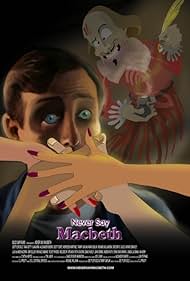Aggiungi una trama nella tua linguaDanny Teller, a high school science teacher, shows up at auditions for Macbeth trying to get his girlfriend back. But the director mistakes Danny's story of love for a passionate acting mono... Leggi tuttoDanny Teller, a high school science teacher, shows up at auditions for Macbeth trying to get his girlfriend back. But the director mistakes Danny's story of love for a passionate acting monologue, and casts him as Witch #1. More comfortable with spacecraft than stagecraft, Danny ... Leggi tuttoDanny Teller, a high school science teacher, shows up at auditions for Macbeth trying to get his girlfriend back. But the director mistakes Danny's story of love for a passionate acting monologue, and casts him as Witch #1. More comfortable with spacecraft than stagecraft, Danny struggles with rehearsals, and incurs the wrath of the cast when he breaks the cardinal ru... Leggi tutto
- Regia
- Sceneggiatura
- Star
- Premi
- 1 vittoria in totale
Foto
- Chuck
- (as Gregory Giles)
Recensioni in evidenza
Other than that? The writing appeared to have been done by ten monkeys who'd never actually settled on one plot, the "cinematography" likely consisted of one tiny video-camera and the editing software that came with it, and the acting is (for the most part) pitiful at best. The characters are mostly bad stereotypes of what an outsider thinks theatre people are supposed to be.
Allow me to clear up any misunderstandings: Not all men involved in theatre are gay. The ones that happen to be gay are typically not "fabulous", overblown, lisping pansies.
Not all directors are psychopaths. In fact, I've never worked with a director who believed in horoscopes or any of the ridiculous BS that guy practiced. (Also, a continuity problem: his fake facial hair was distractingly bad. Next time, even though I hope to God there is no next time, get your actor to grow an actual beard.) Not all techies are genuinely nuts (although Jenni the stage-manager was kinda cool). The ones that look nuts are only pretending to be because they think they're being original.
Now I'll continue. The costuming, for both the actual "story" and the "production" of Macbeth, was rancid. There was no concept for the setting of Macbeth; the witches were wearing synthetic neon wigs, and whichever characters the gay guys played (Malcolm and... ???) appeared to be male strippers. And Ruth, the actress playing Lady Macbeth, wasn't wearing a bra in several scenes. Some women's statures can get away with that; Ruth's definitely did not.
There. Those are most of my strong opinions on this little, um, cinematic adventure. It's nice that so many struggling actors who have only ever gotten bit parts and walk-ons have had this opportunity, but now that "Never Say Macbeth" is a finished product, if any future employers are familiar with it, it's frankly an embarrassment to have on your resume.
The biggest disappointment for me was that the film makers simply started with a little knowledge and proved how dangerous that could be. They knew of the "curse" but had only a high school freshman's impression of that the curse was all about and didn't bother going any deeper.
The Curse of the Scottish Play *actually* started when Shakespeare's acting company put on the Bard's script in honor of their new monarch, James Stuart (the Ist of England, the VIth of Scotland), a man who BELIEVED in witches and ghosts (he'd even written a respected text on the subject) and spent a fortune on the lavish tartans and other costumes for the new production. Shakespeare, in covering the well known bit of Scottish history *did* include a bevy of witches and curses, but that was not the problem - the problem was the scene showing the WITCHES prophesying Banquo's heirs (James traced his lineage to Banquo) reigning on in Scotland - essentially demonic involvement in the founding of James' house! THAT was a problem for a man who believed in witches. James *hated* the production which seemed to him to be a direct attack on his legitimacy, and in no small part as a result, the production flopped. With the fortune spent on the lavish new costumes lost, OF COURSE the acting company viewed the play as under a curse and took to not speaking of it or quoting from it in the playhouse. In fact, it would be 150 years before the play would enter the regular canon of Shakespeare's performed work with James long gone and the merits of an actually very good play rising to the surface.
Why the play is STILL considered cursed is another story entirely (if just as easy to understand): so many actors keep getting injured during performances. MANY of Shakespeare's plays have fencing and/or sword fights in them - but only The Scottish Play uses big 26lb., hard to choreograph broad swords rather than light rapiers. One slip and an actor loses a finger or two. Then there the other "special effects" that usually accompany the witches' entrances - I'll never forget when Alan Minnie overloaded the "flashpots" in the college production I was in and we blew Julia Lover's eyebrows off as the elevator raised the witches behind them. Any wonder actors still like to think of the play as cursed?
What a movie - comic farce or horror story - someone could make out of all that without this film's passionate cast of three play repertory ghosts (lost in a supposed theatre fire while rotating in The Scottish Play, Oscar Wilde's IMPORTANCE OF BEING EARNEST and Gilbert & Sullivan's PIRATES OF PENZANCE) which this little Independent (ego production?) tries to hang much of its "entertainment" on. Yes, the silly juxtaposition of lines from all three productions in the film's production of the Scottish Play is good for a few cheap laughs, but it really doesn't have anything to do with the concept the film tries to sell.
If you go with it, stick around for the sing-along lyrics for G&S's "Modern Major General" during the final credits and the "ghost" telling the audience to "go home" as if he lost the part in FERRIS BUELLER'S DAY OFF to Matthew Broderick and never got over that either. They are as much fun as anything else in the film.
I più visti
Dettagli
- Tempo di esecuzione1 ora 26 minuti
- Colore
Contribuisci a questa pagina













